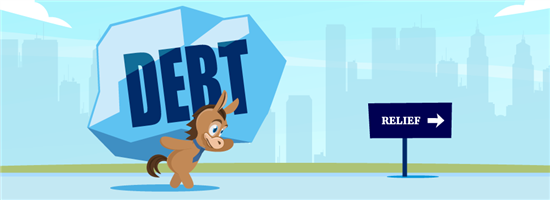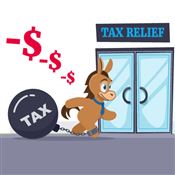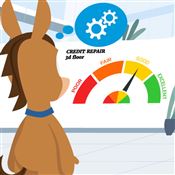How Does National Debt Relief Work?
Can National Debt Relief really help you reduce debt? Find out how it works and if it's your best solution to financial freedom.
 |
National Debt Relief negotiates with your creditors to let you pay off your debts at a lower amount. This way, you get to settle debts based on how much you can afford.
Does it sound too good to be true? It might be since savings aren't guaranteed with debt relief services.
Read on to find out how it all works and how you can get started.
What is National Debt Relief?
National Debt Relief offers debt relief services to help you lessen the debts that you owe. It's been in the industry since 2009 and primarily offers debt settlement and debt consolidation.
It has a solid track record in the business, helping over 550,000 clients since it started.[1] Plus, it has a wide partner network where you can access reputable credit counselors, bankruptcy services, and consolidation loans.
- Major credit cards
- Department store cards
- Gas cards
- Bank loans from prior banks
- Installment loans
- Finance companies
- Unsecured personal loans
- Repossessions
- Qualified business debts
- Bank, overdraft, and associated fees
- Cell phones (not currently used)
- Veterinarian bills over $500
- Credit unions (members who are not federal or military employees)
- Abandoned timeshares with current statements
- Judgments that are older than 6 months
- Back rent (not a current resident)
- Certain student debts
How Does National Debt Relief Work?
National Debt Relief creates a personalized debt relief program based on your debts and what you can afford to pay.
The program can run for 24 to 48 months. You'll set up a dedicated account to make monthly deposits during this period.
Here's where the success of the program lies: National Debt Relief will negotiate with your creditors to reduce the amount you owe. This can take weeks to months to get the best-reduced amount.
If you approve of the new amount, you can pay the lump sum to your creditors with the deposits you've been putting in your account. That way, you can settle your debt with the creditor at a lower amount than what you originally owe.
You only need to approve payments for National Debt Relief's fees once you are satisfied with the reduced amount. National Debt Relief gets results or you don't pay at all.
Imagine Living Life Without Debt
- Get a free savings estimate today
- See how quickly you can be debt free
- No upfront fees and no obligation
Who is National Debt Relief Best For
If you're looking for debt relief options, National Debt Relief can help you out if:[2]
- You are having a legitimate financial hardship, e.g., job loss or medical emergencies
- You have over $7,500 of unsecured debt
- You owe medical bills, credit card debts, or personal loans
National Debt Relief only covers unsecured debts. It means you can't enroll any debts secured with collateral (secured debts), like your secured credit cards and home loans.
Signing up for National Debt Relief could drop your credit score. Plus, your creditors can sue you for unpaid debt, and some may not even agree to settle. You may also owe taxes on forgiven debts, which can limit your potential savings.
If you fit the criteria, read on for the detailed step-by-step process.
Debt Relief Step-by-Step Process
Below is a more detailed breakdown of how National Debt Relief operates.
- Initial Assessment and Consultation
Call for a free consultation to assess your eligibility, and review debts, liabilities, and credit history. National Debt Relief evaluates your financial situation.Maximize this free assessment as you are speaking with professionals. Ask for National Debt Relief's expertise for your best debt relief options.
Imagine Living Life Without Debt
- Get a free savings estimate today
- See how quickly you can be debt free
- No upfront fees and no obligation
- Enrolling in a Debt Relief Program
National Debt Relief creates a plan for you based on your assessment. You will get a personalized debt repayment plan tailored for your debt types and capacity to pay. - Dedicated Account Setup
Set up an FDIC-insured trust account that serves as your dedicated account for monthly deposits. You will use the funds in your account to settle the debt once you approve of the lower amount negotiated by National Debt Relief.The FDIC-insured trust account is in your name and you have complete control of that dedicated account. The money you deposit in the account only gets disbursed when you agree and settle the negotiated amount with your creditors.
National Debt Relief's Fees
You don't need to pay separately for National Debt Relief's fees. They are computed beforehand and are part of your program. Moreover, they charge their fees to your account only when you settle the debt. - Negotiation with Creditors
National Debt Relief calls for your creditors to negotiate for a reduced amount, lower/no fees, and better payment terms. Negotiations can take weeks or months back and forth until you get the amount you can settle for.For most negotiations, you have a short amount of time to settle your debt. Ideally, you would have saved a lump sum in your account to pay off your negotiated debts. If you don't, you can ask National Debt Relief to renegotiate again.
- Settlement and Resolution
You will have a client portal where you can keep track of your debts and get updates on any settlement offers. Once National Debt Relief reaches a reduced amount for your debt, you can review the offer.Important note: You approve the amount and pay your creditors from a dedicated savings account. If you don't approve the amount, you can contact National Debt Relief to renegotiate for a better reduction.
Review your client portals regularly to get progress updates. Keep paying all negotiated debts until you clear all amounts you owe.
The program usually lasts for years. As you keep accruing payments in your dedicated account, National Debt Relief keeps negotiating with your creditors for you.
No, National Debt Relief does not give you money. National Debt Relief negotiates with your creditors so you can settle your debts for a lower amount. Then, you need to pay for National Debt Relief's fees with the funds in your dedicated account.
How will National Debt Relief affect your credit?
Signing up for National Debt Relief impacts your credit score. You must stop paying for your debts intentionally so National Debt Relief can negotiate a lower settlement with your creditor.
Debt negotiations last weeks or months. This means, you'll gain missed payments on your credit reports as National Debt Relief talks to your creditors. As a result, your credit will be negatively affected while National Debt Relief negotiates on your behalf.
However, over time, you can gradually improve your credit score as you pay off your debts one by one. Coupled with good financial habits, you can bounce back from the credit impact of signing up for debt settlement services.
How Much Does National Debt Relief Cost?
National Debt Relief's service fees cost 15–25% of your enrolled debt.[3]
You also get a satisfaction guarantee, where you don't pay for the service unless you approve the settlement amount.
National Debt Relief also doesn't charge for any of the following:
- Initial assessment and consultation (it's free!)
- Sign-up fees for starting your program
- Any form of upfront fee
- Cancellation charges to end your service
Clients who have stayed in National Debt Relief's program have saved around 30% (including fees).[4] However, debt relief and potential savings are always on a case-to-case basis for each client.
What National Debt Relief Does Not Do
Although National Debt Relief can help you tackle your debts, there are limitations to its services.
Remember that National Debt Relief does not:
- Assume consumer debt
You need to consult with a tax agency or tax professional regarding taxes. National Debt Relief only negotiates for your debts. Unfortunately, tax debt isn't included in the list. - Make payments to your creditors
National Debt Relief asks your authority to charge your dedicated account for fees and settlements. But you are the one responsible for making timely payments to creditors. - Advise on tax, bankruptcy, and accounting
National Debt Relief is not a tax agency, a law firm specializing in bankruptcy, or an accounting service. But they do have a network of professionals to help you out. - Offer credit repair services
One of the most intense impacts of missing debt payments is a drop in credit. However, National Debt Relief cannot help you repair your credit afterward.You can browse for cheap credit repair options or get the help of credit repair companies like Credit Saint for your credit fix.
- Provide debt relief in all states
National Debt Relief is not available in all states. During your consultation, it's best to clarify if National Debt Relief offers debt relief in your area.
When signing up for a debt relief program with National Debt Relief, expect your credit score to drop as much as 100 points or more. You also gain negative items on your credit report for intentionally missing your debt payments.
Risks of National Debt Relief
Although a National Debt Relief program may help save you money, there are significant risks you'll want to take note of.
- You need to intentionally miss your payments
If you use the debt settlement route, you must intentionally not pay your dues and balances (if you haven't already).This is because creditors need to see that you really struggle to pay off your debts. This is how National Debt Relief can negotiate for you.
- Your credit score may drop
Because you'll be missing payments, you may see a decrease in your credit score. You should also expect to gain some negative items in your credit report.You can slowly improve your credit afterward once you settle your debts. You may also repair your credit by keeping other positive transactions while you're still in your program. - Debt relief takes time
Negotiations alone can take months before reaching a settlement. Most of National Debt Relief's clients are enrolled in their programs for 24 months or more. - Debt relief can be expensive
Debt relief may not be able to save you as much as you think, especially if you owe large debts. You need to look out for accrued interest, penalties, and charges.These costs will keep piling up until National Debt Relief negotiates your debts and you pay the reduced amount.
- Creditors might sue you for unpaid debt
Creditors may take legal action against you depending on your Statute of Limitations (SOL). National Debt Relief partners with a network of attorneys and professionals to help you deal with the lawsuit (if any).What is Statute of Limitations (SOL)?
Statute of Limitations for debts refers to the period creditors can sue you for unpaid debts. Most SOLs last anywhere from 3–6 years from your date of delinquency (the date of your last payment). Beyond the SOL, any lawsuit against you for unpaid debts won't be valid. - Creditors may refuse to settle
Not all creditors would take the practical road to settle for a lower amount. But National Debt Relief has a strong track record of negotiating with most lenders and creditors. - You may owe taxes on forgiven debt
A tax applies to forgiven debt of $600 and up.[5] The limit also applies per debt (not the total of your enrolled debts).Creditors will send you a Form 1099-C regarding these taxes. Keep this document for tax filing season.
If you still think a debt relief program is worth it in spite of these risks, here's how to sign up with National Debt Relief.
No, National Debt Relief doesn't work with IRS debt. Meaning, they can't assist you in negotiating with the IRS for your back taxes. Alternatively, you can consult with tax relief services to help you with your tax debts or work with the IRS on your own by proposing an Offer in Compromise.[6]
How To Sign Up For National Debt Relief
You need to have more than $7,500 in unsecured debts to sign up. Here's how:
- Sign up for your free assessment here.
- Select your estimated debt owed.
- Fill out your personal information and submit.
National Debt Relief charges 15–25% based on the total enrolled debt in your program. It's best to ask for a breakdown of your fees during your free assessment to know the specific percentage you need to pay.
Is National Debt Relief Legit?
Yes, National Debt Relief is legitimate. It has been in the business since 2009 and has helped over 550,000 clients. Clients who are able to stay in their program save around 50% before fees (30% including service fees).[4]
National Debt Relief also has accreditation and memberships on:[7]
- Better Business Bureau: A+
- American Association for Debt Resolution (AADR)
- International Association of Professional Debt Arbitrators (IAPDA)
This means National Debt Relief is affiliated with many organizations that impose strict compliance requirements in offering debt relief to consumers.
Avoid a company that:
- Demands upfront fees
- Calls you first (unsolicited phone calls)
- Promises lowered debt
- Guarantees you can avoid lawsuits
- Promotes a new government program
- Asks you not to communicate with creditors
To know more about the company and its performance, you can check out its client reviews.
Customer Reviews
National Debt Relief has an average rating of 4.7 out of 5 stars in over 39,000 Trustpilot reviews. And thousands of clients have left feedback on their experience.[8]
For example, John gives good feedback on his timely settlements.
— John Christian Minger (Trustpilot)
On the other hand, not all debt settlements and negotiations are fast, like Gerald's experience.
— Gerald Stiles (Trustpilot)
National Debt Relief isn't really for everyone. Read on to learn more alternatives that are more suitable for your needs.
National Debt Relief Alternatives
Below are other debt relief companies that may have better services for your needs.
Freedom Debt Relief
Freedom Debt Relief is a reputable company that has resolved over $18 billion in debts since 2002. It has helped over 1 million clients resolve credit card debts, medical bills, and personal loans.[9]
Freedom Debt Relief also partners with Legal Partner Network. You can talk to experienced attorneys and debt negotiators in case of lawsuits. The fees of these lawyers and debt negotiators are part of your program, unlike with National Debt Relief.
However, Freedom Debt Relief covers fewer types of unsecured debts compared to National Debt Relief. You'll need to discuss the debts you want to negotiate during your initial consultation.
Accredited Debt Relief
Accredited Debt Relief can offer you consolidation options so you can merge multiple debts into one. It has been in the industry since 2011 and has helped over 300,000 clients, with over $1 billion in client debts paid off.[10]
Accredited Debt Relief is a better fit for you if you prefer to simplify your debt payments by paying only one monthly payment. You can also save on interest and fees that come from each debt.
Like National Debt Relief, Accredited Debt Relief claims that most clients usually pay off their enrolled debts in a span of 24–48 months. Nevertheless, the duration required to successfully complete the program will vary depending on your specific financial circumstances and the total debt owed.
Bottom Line
National Debt Relief negotiates with your creditors to help you settle your debts for a lower amount. It's a long-term solution that may greatly relieve your finances.
However, there are risks involved. Make sure to weigh if the other troubles, such as a lowered credit score, are worth it before you get into a program.
References
- ^ National Debt Relief. Our Track Record, Retrieved 06/06/2024
- ^ National Debt Relief. Qualifications, Retrieved 06/06/2024
- ^ National Debt Relief. FAQs: What will your service cost me?, Retrieved 06/06/2024
- ^ National Debt Relief. FAQs: How Much Will I Save?, Retrieved 06/06/2024
- ^ IRS. About Form 1099-C, Cancellation of Debt, Retrieved 06/06/2024
- ^ IRS. Offer in Compromise, Retrieved 06/06/2024
- ^ National Debt Relief. Accreditations, Retrieved 06/06/2024
- ^ Trustpilot. National Debt Relief, Retrieved 06/06/2024
- ^ Freedom Debt Relief. Why choose Freedom Debt Relief, Retrieved 06/06/2024
- ^ Accredited Debt Relief. Our Track Record, Retrieved 06/06/2024
Imagine Living Life Without Debt
- Get a free savings estimate today
- See how quickly you can be debt free
- No upfront fees and no obligation
Write to Alex Mambaje at feedback@creditdonkey.com. Follow us on Twitter and Facebook for our latest posts.
Note: This website is made possible through financial relationships with some of the products and services mentioned on this site. We may receive compensation if you shop through links in our content. You do not have to use our links, but you help support CreditDonkey if you do.
|
|
|
Compare:



